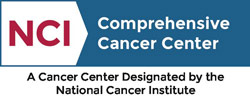Learn About Bile Duct Cancer
Bile duct cancer (cholangiocarcinoma) starts in the bile ducts, which are the thin tubes that carry digestive fluid and connect your liver to your gallbladder and small intestine.
There are two types of bile duct cancer:
- Intrahepatic bile duct cancer. Forms in the bile ducts inside the liver.
-
Extrahepatic bile duct cancer. Forms in the bile ducts outside of the liver.
- Perihilar bile duct cancer is found in the hilum region — the area where the right and left bile ducts exit the liver to form the common hepatic duct.
- Distal bile duct cancer is found in the distal region — the area where the common bile duct passes through the pancreas and ends in the small intestine.
Learn more about bile duct cancer causes, symptoms, diagnosis and treatment.
Why Choose Us for Bile Duct Cancer Treatment
Together with Rutgers Cancer Institute of New Jersey, we are the state’s only NCI-designated Comprehensive Cancer Center, meeting the highest standards in cancer research, treatment, prevention and education in the nation. We offer the most advanced treatment options, including chemotherapy, radiation therapy, targeted therapy, and access to clinical trials, many of which are not available elsewhere.
New Jersey’s Largest Network of Cancer Specialists
We offer access to New Jersey’s largest network of cancer specialists, including nationally and internationally recognized oncologists, surgical oncologists, radiation oncologists, advanced practice nurses and oncology support professionals with advanced credentials in cancer specialty care with expertise in gastrointestinal cancers.
Oncology Nurse Navigators Guide You
Nurse navigators help secure appointments, coordinate follow-up visits related to treatments and procedures, and guide you through aspects of survivorship.
To schedule an appointment with one of New Jersey’s best gastrointestinal cancer specialists, call 844-CANCERNJ or 844-226-2376.
Bile Duct Cancer Causes
Bile duct cancer occurs when DNA mutations cause the cells in the bile duct to multiply out of control and form a tumor. The exact cause of bile duct cancer is unknown. However, certain risk factors increase your chances of getting the disease, including:
- Primary sclerosing cholangitis (inflammation and scarring in the bile ducts causes them to become blocked)
- Chronic ulcerative colitis
- Bile duct cysts (cause swelling, inflammation, and infection)
- Infection with a Chinese liver fluke parasite
Symptoms of Bile Duct Cancer
Bile duct cancer symptoms can include:
- Jaundice (yellowing of the skin or whites of the eyes)
- Dark-colored urine
- Clay-colored stool
- Abdominal pain
- Fever
- Itchy skin
- Nausea and vomiting
- Weight loss with no underlying cause
Patients who have risk factors and/or bile duct cancer symptoms should make an appointment with their physician.
Diagnosing Bile Duct Cancer
The following may be used to diagnose bile duct cancer:
- Medical history and physical examination. Your physician asks important questions about your medical history to analyze your risk factors. He or she also examines you for signs of bile duct cancer.
- Liver function tests. Blood tests that analyze your liver function and give your physician important clues about what is causing your symptoms.
- Carcinoembryonic antigen (CEA) and CA 19-9 tumor marker test. Blood tests that look for increased levels of proteins produced by bile duct cancer cells.
- Imaging tests. Ultrasound, CT, MRI, and MRCP (magnetic resonance cholangiopancreatography) produce pictures of the bile ducts which can be examined for cancer or other conditions.
- Biopsy. Different procedures may be used to collect a small sample of bile duct tissue. After it is collected, the tissue is sent to the laboratory where it is analyzed for cancer.
Bile duct cancer is staged as 0, I, II, III, or IV after it is diagnosed. This helps physicians classify and treat cancer appropriately.
Bile Duct Cancer Treatment
Standard bile duct cancer treatment may include:
- Surgery. The goal of surgery is to remove cancerous tissue. Several procedures can be performed. The bile duct or part of the liver (partial hepatectomy) may be surgically removed. A Whipple procedure may be performed. This is a complex surgery that removes the head of the pancreas, the first part of the small intestine (duodenum), the gallbladder, and the bile duct.
-
Radiation therapy. Uses high-energy radiation to kill cancer cells and stop them from returning.
- External radiation involves radiation from a machine outside of the body.
- Internal radiation places radioactive substances in the body near cancer.
- Chemotherapy. Drugs are used to kill cancer cells or stop them from dividing.
- New types of bile duct cancer treatment that are being studied in clinical trials include:
- Liver transplant. Removing the liver and replacing it with a healthy one from a donor.
- Targeted therapy. Drugs target changes in cells that cause cancer. They sometimes work when chemotherapy does not and they may cause different side effects.
- Immunotherapy. Uses the body's immune system to locate and attack cancer.
Our Oncology Nurse Navigators Will Guide You Through Your Bile Duct Cancer Journey
Our oncology nurse navigators help patients through the entire bile duct cancer journey, from securing initial appointments to coordinating follow-up visits related to treatments and procedures, all the way through aspects of survivorship. Oncology nurse navigators also can refer you to social workers or financial counselors for matters about health insurance, financial and other challenges.
To schedule an appointment with one of New Jersey’s best gastrointestinal cancer specialists, call 844-CANCERNJ or 844-226-2376.





